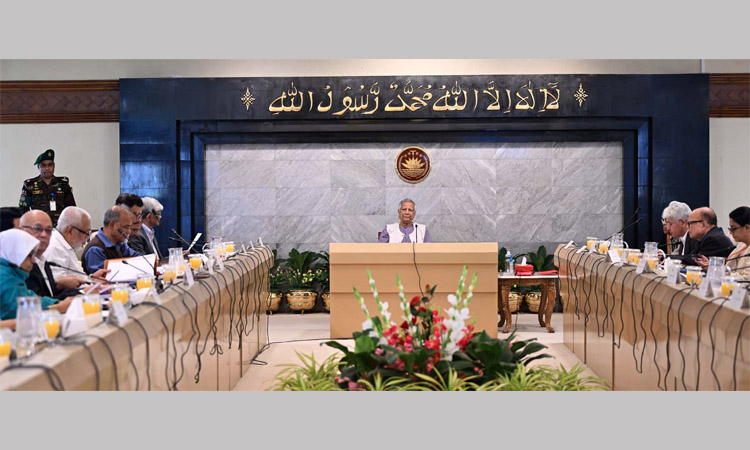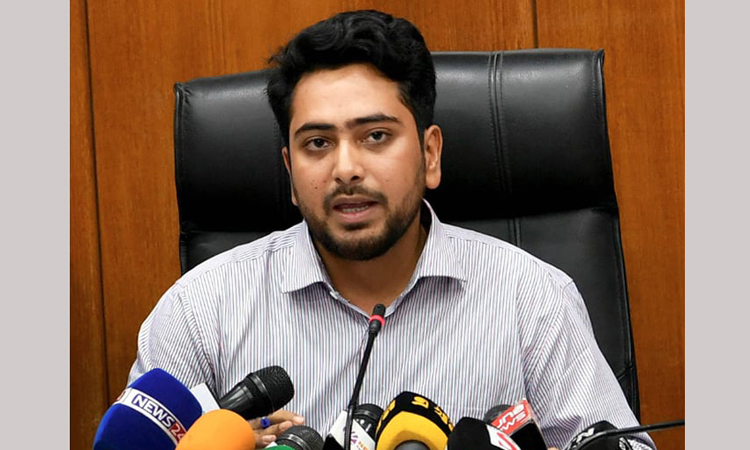Adviser to the ministry of Information and Broadcasting Md. Nahid Islam on Friday reaffirmed the interim government’s firm commitment to fulfilling people’s aspirations despite facing multifaceted challenges including economic struggles and an ever-evolving political environment.
“Along with its continuous efforts to maintain stability, foster unity, and addressing pressing concerns, the government remains committed to realize people’s aspirations emerged through the mass uprising amid political situation and an ever evolving national landscape,” he told BSS in an exclusive interview on completion of six months of the present government.
Nahid, who played a leading role as an Anti-Discrimination Students Movement leader during the July-August uprising, said, “We are steadfast in overcoming political challenges and shaping a future that reflects the will of the people of the country.”
The government’s journey in the last six months has been through multi-dimensional experiences including encountering internal and external conspiracies, managing more than 100 movements, facing continuous political pressure along with economic hardship and broken state structure, said the adviser.
Despite the obstacles, Nahid Islam expressed confidence that with continued dialogue, cooperation, and political goodwill, the six-month-old government that came to power on August 8 last year through a mass uprising, could achieve the change the nation so desperately sought.
“The road ahead will not so smooth, but with the right support, the interim government hopes to lay the foundation for a more stable and prosperous future for the country,” added Nahid, who is also entrusted with the portfolios of post and telecommunication and ICT ministry as its adviser.
Nahid said a major area of public concern has been the government’s handling of economic issues like rising prices of essentials, improving law and order situation and ensuring trial of murderers as the country people have placed enormous expectations on the government that came to power through a mass uprising.
He admitted that the government has faced significant economic challenges saying, “When we took over the administration was in disarray. The bureaucracy and law enforcement agencies were in a state of chaos, and we had to rebuild those from there. It was not an easy task.”
“The previous administration’s practices, particularly the widespread extortion and corruption, had created long-standing problems that would not disappear overnight,” said Nahid.
On political matters, Nahid talked about the divisions that have emerged within the forces of the mass uprising. “Although the uprising brought together and diverse groups united with a desire for reform, many had begun to pursue their self interests rather than the national good,” he said.
Expressing frustration, he said this fragmentation had hindered progress on critical issues, particularly in terms of political unity. “The unity that once existed has been diluted,” he said, acknowledging that this lack of cohesion posed a significant challenge to the government’s reform efforts.
However, Nahid remains hopeful that these divisions are not insurmountable. “I do not believe unity has been entirely lost. We are continuing to engage in discussions to resolve disagreements and avoid returning to the divisive practices of the past.”
The adviser said the true test of the government’s ability to foster unity would come through its success in implementing meaningful reforms.
“The biggest challenge for us is how unified we can be on the issue of reform. The coming months will show how much progress we can make,” he added.
Nahid emphasized that political goodwill is crucial for bringing any meaningful change, and expressed hope that both political parties and the people would work together to eliminate the systemic issues.
“There are elements within the political sphere who are still involved in extortion, and some of the individuals who participated in the uprising are now engaged in such activities,” he said, adding, “Without cooperation, it will be difficult to meet the expectations of the people,” he added.
The issue of reform versus elections has also been a contentious subject, with opposition parties, particularly the BNP calling for early elections, Nahid said adding the government does not view reform and elections as mutually exclusive but rather as complementary objectives.
“The reform commissions are working to bring necessary changes to the electoral and governance systems. These reforms must be implemented before elections…otherwise, the mistakes of the past will be repeated,” he said.
Commenting on media freedom, Islam categorically said that the government has not interfered with the media’s right to freely criticize its policies. “So far, no pressure has been given on the media for criticizing the government,” Nahid said.
However, he pointed out that when the government supports the concept of free media, it has asked the press to be mindful when reporting on sensitive issues like banned student organizations and individuals involved in criminal activities.
Islam acknowledged that some media outlets had become targets of social pressure and protests, but he stressed that law enforcement agencies and the government has intervened to ensure their safety.
Despite these challenges, Nahid emphasized the government’s unwavering commitment to fostering a free and open media environment.
“The government encourages constructive criticism and has already implemented changes based on media feedback. We welcome logical criticism, and we will continue to make adjustments to our policies,” he said.
He also said that the role of the media has sometimes been compromised by political alignments in the past, with some outlets failing to maintain objectivity. Islam urged journalists to clarify the pressures they have faced, which, in his view, would help rebuild trust among the people.







